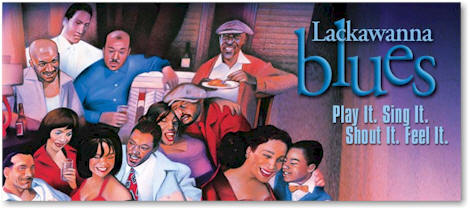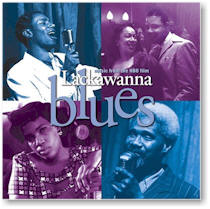Lackawanna Blues
Film Reviewed by Brian Egeston
How Matriarchs Have Made Us
A Film Review of Lackawanna Blues.

Lackawanna Blues (2005) (TV)
Directed by George C. Wolfe
Written by Ruben Santiago-Hudson (play & teleplay)
Having recently lost a grandmother, my senses of the role that strong Black women play in our communities and families has been heightened. We often refer back to Hattie McDaniel’s portrayal of Mammy in Gone With the Wind as a significant feat in Black film history.
On February 12th 2005, many television viewers had the opportunity to witness another amazing celebration of the Black women, and a celebration of the extended Black family, during the television debut of Lackawanna Blues presented by HBO Films.
The film’s cast is comprised of a veritable honor roll of some of the most talented and significant Black actors working today. The film also served as a career screen performance by S. Epatha Merkerson. Already a Tony Award nominee and a series regular for twelve seasons on Law & Order, Merkerson has established an extensive resume. But as the lead character in Lackawanna Blues, Rachel "Nanny" Crosby, Merkerson delivers a performance second only to an actual grandmother.
|
Audio CD (February 8, 2005) Mixing new versions of old songs with originals isn’t a unique concept when it comes to constructing movie music, but it’s seldom been done as effectively as on this soundtrack from the 2005 HBO film Lacakawanna Blues. Macy Gray, Robert Bradley, and perhaps most surprisingly, Mos Def—all of whom have parts in the film—contribute updated material which ranges from the jump blues of Mos Def’s "Caledonia" to Bradley’s sizzling low-down covers of Elmore James’s "One Dime Blues" and Floyd Jones’s grinding "Dark Road." Young old-school vocalist Ricky Fant’ finds a sunny groove on Magic Sam’s "That’s All I Need," and the Blind Boys of Alabama, the go-to group for gospel, bring the church on a stunning "Faith and Grace." The album’s success lies in the way the predominantly obscure songs are sequenced. The spare but lovely Piedmont acoustic picking of Etta Baker’s "One Dime Blues," Jimmy Scott’s yearning, string-drenched ballad "If I Ever Lost You," and J.J. Jackson’s Impressions’ styled, finger-popping "But It’s Alright" have little in common, yet comfortably share space with each other and the newly recorded tunes. This makes for a engaging collection of music that stands on its own as a compelling listening experience, even for those who haven’t seen the movie that inspired it. ’Hal Horowitz |
Lackawanna Blues is the screenplay adaptation of Ruben Santiago-Hudson’s autobiographical one-man stage play. Set just before desegregation, the film revisits an African-American community when all they had was each other. It is a trip back to days in which cornbread and beans was a feast for kings and a jukebox and a bottle of whiskey was the only thing needed to turn a living room into a nightclub.
Lackawanna Blues takes place mostly in Nanny’s home which serves as a rooming house, juke joint, restaurant, beauty parlor, and an orphanage of sorts to Rueben Jr. (Santiago’s Hudson’s childhood character). When Reuben’s parents are no longer capable of taking care of him, Nanny takes the boy in as her own and he joins a house filled with wayward and eclectic drifters in Nanny’s stable of extended family members. From a one-armed ax-swinger to a rake-swinging schizophrenic, the young boy learns the lessons of life in the strangest classroom imaginable.
Acclaimed stage director, George C. Wolfe, is at the helms of this project and he drives it with amazing splendor in his feature film directorial debut. From the film’s fast-paced opening, there is a rhythm that flows from the music into the dialogue and into the action and continues through various scene transitions. At times, the movie plays out as an opera that doesn't know it’s supposed to be a blues song and instead transforms itself into a lovechild of be-bop and gospel. It swings, it hits, it slams, it jams and then it starts all over again.
With such a vast ensemble of actors, who on other projects have garnered every inch of the spotlight, Wolfe manages to showcase each talent with just the proper amount of seasoning and allows cast members to simmer for just the right length of time. The film bears names such as Delroy Lindo, Jeffery Wright, Terrence Dashon Howard, Louis Gossett Jr., Jimmy Smits, and Liev Schreiber. Another Hollywood marquee name attached to the project, yet not on the screen, is Halle Berry who serves as one of the executive producers.
Some of the talent, however, boils over and creates a flash fire performance. Perhaps the best example is the surprising cameo of Mos Def as the bandleader. After his brief showcase, viewers will wonder is there anything Mos Def can't do.
Wolfe is quoted as saying, ’I hope they [viewers] find themselves somewhere in the story.’ While everyone from various generations may not find themselves in the story, they may find someone from their past within the film.
Purveyors of the written word, more importantly of the Black written word, and Black culture may find a ghostlike comparison to the film’s characters with that of their own ancestors. The actors deliver spot-on dialect so convincing it’s easy to forget they’re watching a movie and instead believe the fallacy that they’re peeking through the window of a deceased grandmother’s house or the screen door of a great aunt.
Hollywood has a knack for well’Hollywooding a culture of which they have no concept. But Lackawanna Blues is so real, so indicative of a time and a culture; this film serves as a standard for how to transform a place, a time and a people onto the screen.
The food is real. The way the food is described is real. The way to food is served is real. The way the food is devoured by potbellied old men is real.
But perhaps the most realistic facet of the film is the portrayal of community. Lackawanna Blues revisits the painful question of integration’s affect on Black culture.
Through the giving and stern sprit of Nanny, we have the opportunity to reexamine our matriarchs and how they are an intricate part in—not only our success—but also our survival. From the milk of her bosom to the stash in her bra, from the grace of her stance to weight on her feet, from the balm of her touch to the leather on her strap, from the candy in her purse to the grease on her stove, from the peas of her porch to the pallets on her floor, from the scars on her face to the forgiveness in her heart, she has made us who we are and what we shall become.
Lackawanna Blues reminds us that what’s missing is the matriarchs.

Read More AALBC.com Film Reviews

